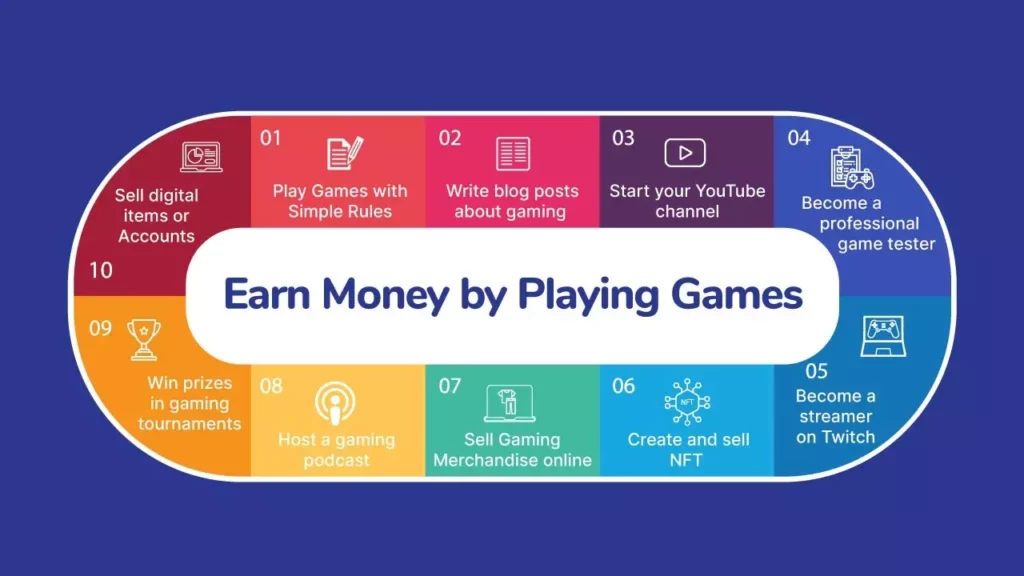How Rewarded Gaming Portals Are Shaping the Future of Online Play
How Rewarded Gaming Portals Are Shaping the Future of Online Play
Blog Article
Exactly How Play-to-Earn Games Are Changing the Pc Gaming Sector

Comprehending Play-to-Earn Mechanics
The play-to-earn version has actually become an advanced principle within the pc gaming sector, fundamentally altering the connection in between gamers and the video games they engage with. This model allows players to make substantial rewards, typically in the kind of cryptocurrencies or non-fungible symbols (NFTs), via their in-game tasks. Unlike traditional video gaming structures that generally monetize via subscription fees or single purchases, play-to-earn games incentivize player participation by straight connecting gameplay success to real-world worth.
At the core of play-to-earn auto mechanics is the integration of blockchain technology, which guarantees transparency and provable possession of in-game properties. Gamers can get, offer, or trade these assets in decentralized marketplaces, empowering them with financial firm formerly hidden in conventional gaming settings. Each gamer's payment to the game ecological community-- be it via skillful play, critical trading, or area involvement-- enhances the total video gaming experience while supplying them a chance to generate revenue.
As gamers invest time and sources, they not just deepen their involvement with the video game however additionally promote a dynamic economy that reflects their cumulative efforts (play and earn rewards). This makeover of gameplay into a monetizable endeavor is reshaping both gamer motivation and game layout
Economic Effect On Players

In addition, play-to-earn designs democratize accessibility to financial benefits. Gamers from differing socio-economic histories can participate and possibly gain substantial earnings, linking spaces that exist in traditional job markets. This paradigm change promotes financial independence, especially in regions where job opportunity may be restricted.
Furthermore, the introduction of digital economic situations enables gamers to develop wide range with tactical financial investments in in-game possessions, which can value gradually. This has led to the introduction of a new class of players who come close to play-to-earn as a serious income-generating activity, usually causing the reinvestment of earnings into the pc gaming ecological community itself. Ultimately, the financial influence on players is profound, as they navigate a landscape where recreation and income merge.
The Role of Blockchain Innovation
What makes blockchain modern technology a keystone of play-to-earn games is its capacity to give decentralization, safety, and openness. By making use of a dispersed ledger system, blockchain ensures that all purchases within the game are videotaped in an immutable fashion, permitting players to verify ownership of in-game assets without depending on a central authority. This transparency promotes trust amongst players, as they can individually validate the deficiency and provenance of electronic products, boosting their value.
Moreover, blockchain technology empowers gamers with decentralization, allowing them to participate in peer-to-peer purchases. Gamers are no more confined to in-game economic situations managed by developers; instead, they can trade, sell, or rent their possessions openly in open marketplaces. This change not only boosts the total liquidity of electronic properties yet likewise urges more meaningful player involvement, as users can directly gain from their effort and time bought the video game.
Additionally, blockchain promotes the production of clever agreements, which automate numerous in-game processes, from incentives circulation to governance devices. play and earn rewards. This development minimizes the danger of scams and makes sure reasonable play, more solidifying blockchain's important role in the development of play-to-earn video gaming
Difficulties and Objections
Frequently, play-to-earn video games encounter significant obstacles and objections that can hinder their development and acceptance within the more comprehensive pc gaming community. One key concern is the possibility for Website a speculative bubble, where the value of in-game assets can fluctuate drastically, resulting in financial losses for gamers. This volatility threatens the stability that conventional video gaming environments commonly provide.
Moreover, the combination of blockchain innovation often raises questions regarding ecological sustainability. The power consumption useful link associated with particular blockchain networks has triggered arguments regarding the environmental impact of these video games. Movie critics say that the carbon impact created by play-to-earn systems could deter eco-conscious gamers.
Furthermore, there are concerns regarding ease of access and inclusivity. Many play-to-earn games require players to invest substantial in advance resources to obtain essential assets, producing barriers for those with minimal economic resources. This model can unintentionally create a divide in between wealthier players and those that can not afford to take part.
Future Patterns in Video Gaming
As the gaming sector continues to evolve, numerous future patterns are emerging that assurance to reshape the landscape of play-to-earn video games and beyond. One considerable trend is the enhancing assimilation of blockchain modern technology, which enhances transparency and the original source safety and security in purchases. This will likely lead to higher count on among players, encouraging larger adoption of play-to-earn models.
In addition, the surge of non-fungible tokens (NFTs) is established to change electronic possession, enabling gamers to really have in-game possessions. This shift will not just empower players yet additionally develop new economic opportunities within the digital environment. The convergence of gaming with other sectors, such as social media and decentralized finance (DeFi), is expected to promote cutting-edge gameplay auto mechanics and monetization methods.
Moreover, developments in expert system and equipment learning will allow more individualized video gaming experiences, accommodating private player choices and boosting interaction. Finally, the growing focus on community-driven growth will likely affect video game layout, as players significantly join shaping their gaming settings. Collectively, these patterns show a transformative future for the gaming industry, where play-to-earn designs will certainly play a central role in redefining player communication and value development.
Verdict
To conclude, play-to-earn games represent a substantial shift in the gaming sector, promoting financial possibilities via cutting-edge mechanics that take advantage of blockchain modern technology. This design not just democratizes accessibility to financial advantages for gamers from different socio-economic backgrounds however also encourages area involvement and empowerment. Regardless of dealing with challenges and criticisms, the potential for future advancements suggests that play-to-earn games will certainly continue to form the video gaming landscape, using new opportunities for wealth production and player involvement.
The emergence of play-to-earn video games represents a significant shift in the gaming sector, reshaping the relationship between players and the digital economic situation (play and earn rewards).The play-to-earn design has arised as an advanced idea within the video gaming market, fundamentally modifying the relationship in between gamers and the games they engage with. Unlike traditional pc gaming structures that normally monetize through subscription costs or single purchases, play-to-earn video games incentivize player participation by straight linking gameplay success to real-world value
These innovative pc gaming platforms encourage players to generate real-world earnings through their in-game tasks, thus changing the standard notion of pc gaming from a mere activity into a sensible economic possibility. Despite encountering challenges and criticisms, the capacity for future advancements suggests that play-to-earn games will certainly continue to shape the gaming landscape, supplying brand-new opportunities for riches creation and gamer participation.
Report this page